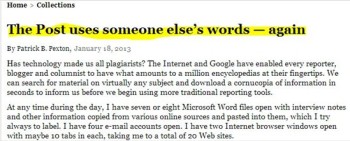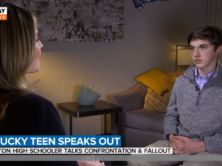
(Credit: Washington Post, screenshot, highlight added)
After learning its Jan. 12 story on the Panama Canal contained plagiarism, The Washington Post apologized and reportedly suspended the reporter, William Booth, for three months. Despite two separate anonymously-sourced stories in the Post itself reporting Booth was suspended, the Post’s senior editor for personnel Peter Perl wouldn’t confirm to iMediaEthics if Booth was suspended, telling us that “As longstanding matter of policy, we never comment on private matters such as personnel actions.”
In an Editor’s Note atop William Booth’s article, “Expanded Panama Canal sparks race to be ready for bigger cargo ships,” the Washington Post discloses that the article plagiarized “four sentences…in whole or in substantial part” from Andrea Hricko’s article “Progress and Pollution: Port Cities Prepare for the Panama Canal Expansion,” which was published in Environmental Health Perspectives. The Post added:
“It is The Post’s policy that the use of material from other newspapers or sources must be properly attributed. The Post apologizes to Andrea Hricko, to Environmental Health Perspectives, and to its readers for this serious lapse.”
In addition, The Washington City Paper published a “full statement” from the Post in which Booth apologized and called the plagiarism “an inadvertent and sloppy mistake.” The statement explains that the Post reviewed Booth’s article after being “alerted to the unattributed” aspects of the report on Jan. 15. According to the Post, in addition to the online editor’s note, the newspaper ran a print version as well, and Post Executive Editor Martin Baron and Booth both apologized to Hricko in a letter.
Booth declined to comment to iMediaEthics about how the plagiarism happened and his punishment, instead referring us to his apology statement.
Likewise, Hricko wouldn’t tell iMediaEthics about how she found the plagiarism, her reaction to seeing her work plagiarized and how she reached a satisfactory resolution with the Washington Post because she said she decided against doing any more interviews.
But, she is quoted by the Washington Post as describing the newspaper’s response to her complaint as “with great integrity and responsibility,”
A news story from the Washington Post provided more information about the level of the plagiarism in Booth’s article, summarizing:
“The problematic sentences are similar but not exact duplicates. Booth changed the phrasing in some of them and added clauses and new information to others.”
And for a side-by-side comparison, the Post offered (emphasis ours)
- Hricko: “Georgia’s Port of Savannah has gotten the go-ahead to dredge its channel, which will cost more than $650 million.”
- Booth: “After years of review, and amid fear for wetlands and endangered species, Georgia’s Port of Savannah has finally gotten the go-ahead to dredge its channel, which will cost more than $650 million.”
Post ombudsman Patrick Pexton responded to this latest plagiarism and attribution case questioning: “Has technology made us all plagiarists?”
According to Pexton, “This is the third column I have written about plagiarism at The Post since I began as ombudsman, and there was a fourth case last September, while I was away, that I neglected.”
Pexton confirmed to iMediaEthics by email that the fourth case which he didn’t address in a column was that of Simon Denyer whose September report for the newspaper earned a correction to disclose its failure to attribute two quotes. Pexton didn’t write about that case because he was on vacation when it happened and that “when I returned, the election season was in full swing and I was getting tons of inquiries and email on that so I decided to forgo writing about the Denyer case.”
Of course, those weren’t the only attribution or plagiarism cases at the Washington Post since Pexton was announced public editor in February of 2011. Check out iMediaEthics’ list, not including this current case against William Booth:
- Sari Horwitz: in March 2011 the Post suspended Horwitz, a Pulitzer Prize-winning reporter, because she plagiarized from the Arizona Republic. Two of her articles on the Tuscon, Arizona shootings included “substantial material that was borrowed and duplicated, without attribution,” the Washington Post’s editor’s note at the time read.
- Robert Rigney: The Washington Post ended its freelance relationship with travel freelancer Robert Rigney after he was busted for plagiarizing from the documentary Absolut Warhola in an April article.
- Anna Lewis: Post ombudsman Pexton wrote in September 2011 about accusations of plagiarism against Anna Lewis. Professor Natahan Ensmenger said her August essay for the Post lifted from “his, and fellow academics’, considerable research,” according to Pexton, but Pexton decided she really just used “sloppy attribution.”
- Elizabeth Flock: In April, Flock resigned from the Post after the newspaper added an editor’s note disclosing the “earlier version” of her blog on NASA’s Viking robots “made inappropriate, extensive use of an original report by Discovery News and also failed to credit that news organization as the primary source.” Flock told iMediaEthics by email that the incident was “an honest mistake” and that she “forgot to both credit and link.”
- Simon Denyer: As iMediaEthics wrote in September of 2012, the Post corrected Denyer’s Sept. 4 article that didn’t “credit The Caravan, an Indian magazine, for two statements that it originally published in 2011.”
There was also the Post’s review of Fareed Zakaria’s work after he apologized for plagiarizing in Time. (Separately, the Post apologized after it ran an article about what turned out to be baseless claims that Zakaria didn’t give proper credit in his book The Post-American World.)
Pexton noted the three-month suspension Booth has reportedly received is “the same punishment as reporter Sari Horwitz received in March 2011 in another plagiarism case.” iMediaEthics asked Pexton if this is a standard punishment at the Washington Post, but he explained “as far as I know there is no standard punishment for plagiarism cases, they are handled on a case-by-case basis.” Pexton also referred us to senior editor for personnel Peter Perl, who said:
“We have written standards and ethics that declare plagiarism to be ‘an unforgivable sin’ but there is no such thing as a ‘standard punishment’ because each case is considered on its own merits.”
Despite these cases, Pexton told iMediaEthics“The Post has not announced any newsroom-wide procedures to address plagiarism, nor am I aware of any ongoing efforts to do so,” and then referred us to Perl for more information. But, Perl told iMediaEthics by email “we have ongoing training in standards and ethics, and this has not changed our practices.”
Pexton also told iMediaEthics by email that “I do not believe that all of Booth’s work was reviewed,” but directed us again to Perl, who said the Washington Post “conducted a comprehensive review.”
Hat Tip: Washington City Paper





